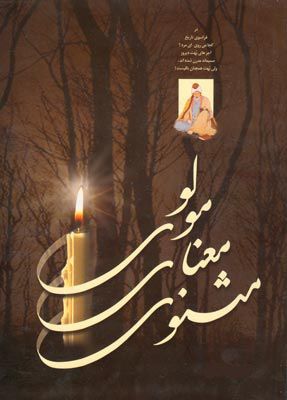مولوی - مثنوی معنوی - دفتر اول - بخش ۱۱۶ | Rumi - Spiritual Couplets - Book 1 - Part 116
How the Bedouin bade his wife be patient and declared to her the excellence of patience and poverty.
Her husband said to her, “How long wilt thou seek income and seed-produce? What indeed is left of (our) life? Most (of it) is past.
The sensible man does not look at increase or deficiency, because both (these) will pass by like a torrent.
2290-Whether it (life) be pure (clear and untroubled) or whether it be a turbid flood, do not speak of it, since it is not enduring for a moment.
In this world thousands of animals are living happily, without up and down (anxiety).
The dove on the tree is uttering thanks to God, though her food for the night is not (yet) ready.
The nightingale is singing glory to God (and saying), ‘I rely on Thee for my daily bread, O Thou who answerest (prayer).’
The falcon has made the king's hand his joy (the place in which he takes delight), and has given up hope of (has become indifferent to) all carrion.
2295-Similarly you may take (every animal) from the gnat to the elephant: they all have become God's family (dependent on Him for their nourishment), and what an excellent nourisher is God!
All these griefs that are within our breasts arise from the vapour and dust of our existence and wind (vain desire).
These uprooting griefs are as a scythe to us: (to think that) this is such and such or that that is such and such is a temptation (of the Devil) to us.
Know that every pain is a piece of Death: expel (that) part of Death from thee, if there be a means (of doing so).
When thou canst not flee from the part of Death, know that the whole of it will be poured upon thy head.
2300-If the part of Death has become sweet to thee, know that God will make the whole sweet.
Pains are coming from Death as (his) messengers: do not avert thy face from his messenger, O foolish one!
Whoever lives sweetly (pleasantly) dies bitterly (painfully): whoever serves his body does not save his soul.
Sheep are driven from the plains (to the town): the fatter they are, the quicker they are killed.
The night is past and dawn is come. O my soul, how long wilt thou take up (again) the tale of gold from the beginning?
2305-Thou wert young (once), and (then) thou wert more contented: (now) thou hast become a seeker of gold, (but) at first thou wert gold indeed (precious and perfect).
Thou wert a fruitful vine: how hast thou become unsaleable (worthless)? How hast thou become rotten when thy fruit is ripening?
Thy fruit ought to become sweeter and not move farther backwards like rope-makers.
Thou art my wife: the wife must be of the same quality (as the husband) in order that things may go rightly.
The married pair must match one another: look at a pair of shoes or boots.
2310-If one of the shoes is too tight for the foot, the pair of them is of no use to thee.
Hast thou ever seen one leaf of a (folding) door small and the other large, or a wolf mated with the lion of the jungle?
A pair of sacks on a camel do not balance properly when one is small and the other of full size.
I march with stout heart towards contentment: why art thou betaking thyself to revilement?”
In this fashion the contented man, moved by sincerity and ardour, was talking to his wife till daybreak.
صبر فرمودن اعرابی زن خود را و فضیلت صبر و فقر بیان کردن با زن
شوی گفتش چند جویی دخل و کشت
خود چه ماند از عمر افزونتر گذشت
عاقل اندر بیش و نقصان ننگرد
زانک هر دو همچو سیلی بگذرد
خواه صاف و خواه سیل تیرهرو
چون نمیپاید دمی از وی مگو
اندرین عالم هزاران جانور
میزید خوشعیش بی زیر و زبر
شکر میگوید خدا را فاخته
بر درخت و برگ شب نا ساخته
حمد میگوید خدا را عندلیب
کاعتماد رزق بر تست ای مجیب
باز دست شاه را کرده نوید
از همه مردار ببریده امید
همچنین از پشهگیری تا به پیل
شد عیال الله و حق نعم المعیل
این همه غمها که اندر سینههاست
از بخار و گرد باد و بود ماست
این غمان بیخکن چون داس ماست
این چنین شد و آنچنان وسواس ماست
دان که هر رنجی ز مردن پارهایست
جزو مرگ از خود بران گر چارهایست
چون ز جزو مرگ نتوانی گریخت
دان که کلش بر سرت خواهند ریخت
جزو مرگ ار گشت شیرین مر ترا
دان که شیرین میکند کل را خدا
دردها از مرگ میآید رسول
از رسولش رو مگردان ای فضول
هر که شیرین میزید او تلخ مرد
هر که او تن را پرستد جان نبرد
گوسفندان را ز صحرا میکشند
آنک فربهتر مر آن را میکشند
شب گذشت و صبح آمد ای تمر
چند گیری این فسانهٔ زر ز سر
تو جوان بودی و قانعتر بدی
زر طلب گشتی خود اول زر بدی
رز بدی پر میوه چون کاسد شدی
وقت میوه پختنت فاسد شدی
میوهات باید که شیرینتر شود
چون رسن تابان نه واپستر رود
جفت مایی جفت باید همصفت
تا برآید کارها با مصلحت
جفت باید بر مثال همدگر
در دو جفت کفش و موزه در نگر
گر یکی کفش از دو تنگ آید به پا
هر دو جفتش کار ناید مر ترا
جفت در یک خرد وان دیگر بزرگ
جفت شیر بیشه دیدی هیچ گرگ
راست ناید بر شتر جفت جوال
آن یکی خالی و این پر مال مال
من روم سوی قناعت دلقوی
تو چرا سوی شناعت میروی
مرد قانع از سر اخلاص و سوز
زین نسق میگفت با زن تا بروز
Poet: Maulana Rumi
Translation: Reynold A. Nicholson
Edited by: @tamim
